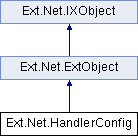
Public Member Functions | |
| virtual string | Serialize () |
 Public Member Functions inherited from Ext.Net.ExtObject Public Member Functions inherited from Ext.Net.ExtObject | |
| virtual bool | HasExplicitValue (string name) |
Properties | |
| virtual string | Scope [get, set] |
| The scope in which to execute the handler function. The handler function's 'this' context. More... | |
| virtual string | Delegate [get, set] |
| A simple selector to filter the target or look for a descendant of the target. More... | |
| virtual bool | StopEvent [get, set] |
| True to stop the event. That is stop propagation, and prevent the default action. More... | |
| virtual bool | PreventDefault [get, set] |
| True to prevent the default action. More... | |
| virtual bool | StopPropagation [get, set] |
| True to prevent event propagation. More... | |
| virtual bool | Normalized [get, set] |
| False to pass a browser event to the handler function instead of an Ext.EventObject. More... | |
| virtual int | Delay [get, set] |
| The number of milliseconds to delay the invocation of the handler after the event fires. More... | |
| virtual bool | Single [get, set] |
| True to add a handler to handle just the next firing of the event, and then remove itself. More... | |
| virtual int | Buffer [get, set] |
| Causes the handler to be scheduled to run in an Ext.util.DelayedTask delayed by the specified number of milliseconds. If the event fires again within that time, the original handler is not invoked, but the new handler is scheduled in its place. More... | |
| virtual Dictionary< string, object > | Args [get, set] |
| Custom arguments passed to event handler. More... | |
| virtual Observable | Target [get, set] |
| Only call the handler if the event was fired on the target Observable, not if the event was bubbled up from a child Observable. More... | |
| virtual string | TargetID [get, set] |
| Only call the handler if the event was fired on the target Observable, not if the event was bubbled up from a child Observable. More... | |
| virtual string | Element [get, set] |
| This option is only valid for listeners bound to Components. The name of a AbstractComponent property which references an element to add a listener to. This option is useful during AbstractComponent construction to add DOM event listeners to elements of Components which will exist only after the AbstractComponent is rendered. More... | |
| virtual string??? | TargetProxy [get] |
| override ConfigOptionsCollection | ConfigOptions [get] |
 Properties inherited from Ext.Net.ExtObject Properties inherited from Ext.Net.ExtObject | |
| virtual ConfigOptionsCollection | ConfigOptions [get] |
| virtual ConfigOptionsExtraction | ConfigOptionsExtraction [get] |
| virtual DefaultValueMode | DefaultValueMode [get, set] |
 Properties inherited from Ext.Net.IXObject Properties inherited from Ext.Net.IXObject | |
| ConfigOptionsCollection | ConfigOptions [get] |
| ConfigOptionsExtraction | ConfigOptionsExtraction [get] |
| DefaultValueMode | DefaultValueMode [get, set] |
Detailed Description
Member Function Documentation
◆ Serialize()
|
inlinevirtual |
Property Documentation
◆ Args
|
getset |
Custom arguments passed to event handler.
summary> /summary>
◆ Buffer
|
getset |
Causes the handler to be scheduled to run in an Ext.util.DelayedTask delayed by the specified number of milliseconds. If the event fires again within that time, the original handler is not invoked, but the new handler is scheduled in its place.
◆ ConfigOptions
|
get |
◆ Delay
|
getset |
The number of milliseconds to delay the invocation of the handler after the event fires.
◆ Delegate
|
getset |
A simple selector to filter the target or look for a descendant of the target.
◆ Element
|
getset |
This option is only valid for listeners bound to Components. The name of a AbstractComponent property which references an element to add a listener to. This option is useful during AbstractComponent construction to add DOM event listeners to elements of Components which will exist only after the AbstractComponent is rendered.
◆ Normalized
|
getset |
False to pass a browser event to the handler function instead of an Ext.EventObject.
◆ PreventDefault
|
getset |
True to prevent the default action.
◆ Scope
|
getset |
The scope in which to execute the handler function. The handler function's 'this' context.
◆ Single
|
getset |
True to add a handler to handle just the next firing of the event, and then remove itself.
◆ StopEvent
|
getset |
True to stop the event. That is stop propagation, and prevent the default action.
◆ StopPropagation
|
getset |
True to prevent event propagation.
◆ Target
|
getset |
Only call the handler if the event was fired on the target Observable, not if the event was bubbled up from a child Observable.
◆ TargetID
|
getset |
Only call the handler if the event was fired on the target Observable, not if the event was bubbled up from a child Observable.
◆ TargetProxy
|
getprotected |
The documentation for this class was generated from the following files:
- HandlerConfig.cs
- HandlerConfigConfigOptions.cs